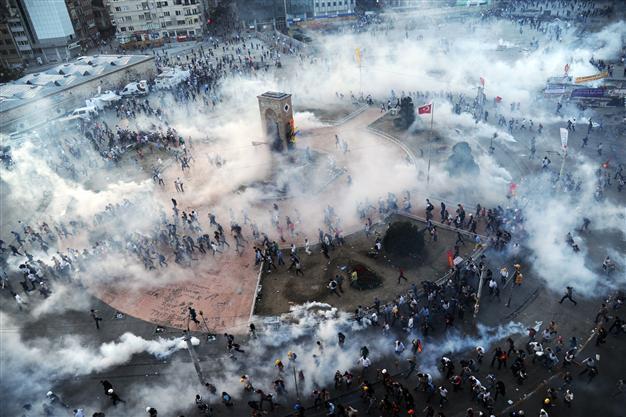Human Rights Watch report slams Turkey over growing intolerance
NEW YORK

According the report, the government’s response to the Taksim Gezi Park protests in Istanbul and anti-government protests in other cities demonstrated its 'intolerance of the right to peaceful assembly and free expression.' AFP photo
The Turkish government is demonstrating a growing intolerance of political opposition, public protest and critical media,
Human Rights Watch (HRW) said in an annual report Jan. 21.
“Harsh police crackdowns on protesters, a muzzled press, unfair trials, and a deeply flawed criminal justice system have marked Prime Minister [Recep Tayyip] Erdoğan’s government’s human rights record in 2013,” said Emma Sinclair-Webb, senior researcher for Turkey at the New York-based organization.
“The crackdown overshadowed efforts toward peace with the Kurds, but unless the government is prepared to uphold everyone’s right to assembly, association, and free speech, the chances of solving the Kurdish issue are remote,” she said.
The 667-page report, presented in Berlin, examines the state of human rights in more than 90 countries. Though it is highly critical of Turkey, it praised the Turkish government for taking positive initial steps in a peace process with the country’s Kurdish minority, announcing talks with imprisoned Kurdistan Workers’ Party (PKK) leader Abdullah Öcalan to end the decades-long armed conflict with the armed group.
The report also cited “positive steps” that the government had taken in 2013, such as the announcement of a “democratization package” of reforms, ending the headscarf ban for women in the civil service, signaling that the 10 percent election threshold that has kept minority parties out of Parliament would be lowered, and easing the restriction on mother-tongue education by permitting it in private schools.
But the report said the government’s response to the Taksim Gezi Park protests in Istanbul and anti-government protests in other cities demonstrated its intolerance of the right to peaceful assembly and free expression, while highlighting the fatalities and injuries of nonviolent protesters by the police.
“During the Istanbul Gezi Park protests and those in other cities between late May and September, the police severely injured scores of nonviolent protesters and six people died. Police officers are facing trial proceedings for killing two protesters, but there have been no prosecutions of the police for serious injuries and excessive use of force,” the report said.
Pressure on mediaIt also criticized the Turkish government for pressuring the media, especially during the Gezi protests.
“Government pressure on the media was reflected in the biased or muted coverage of the Gezi protests ... The mute or biased coverage of the Taksim Gezi protests in much of Turkey’s media highlighted the reluctance of many media companies to report news impartially when it conflicts with government interests. In the course of the year, scores of media workers, among them highly respected mainstream journalists and commentators writing critically of the government in different media, were fired from their jobs,” the report said.
“Turkey continued to prosecute journalists in 2013, and several dozen remain in jail. The trial continued of 44 mainly Kurdish journalists and media workers (20 in detention since December 2011, at time of writing) for alleged links to the Union of Kurdistan Communities (KCK), a body connected with the PKK. The government continued efforts to amend some laws that are used to limit free speech,” it said.
Restrictions on free speech and association were also evident in the high number of prosecutions and ongoing trials of journalists, political activists, lawyers and students, according to the report. “Lengthy pretrial detention remains the norm, despite judicial reform efforts. Many of those incarcerated are accused of links to the [KCK],” it said.
The report also touched on the Uludere/Roboski Massacre. “An indication of entrenched resistance to holding public officials and military accountable for abuses was the lack of justice for victims and their families two years after the December 2011 Turkish air force bombardment that killed 34 Kurdish villagers in Uludere,” the report said.
Mass trials, in which multiple defendants face charges of terrorism or plotting a coup, have raised serious concerns that such trials are unfair and politicized, the report also said.
“These concerns overshadowed the Ergenekon trial dealing with coup plots against the government in the early 2000s, which concluded in August without examining human rights abuses in which key defendants are implicated,” it said.
